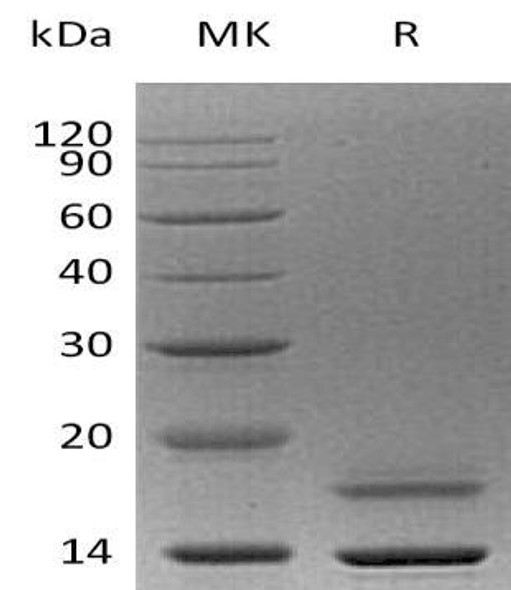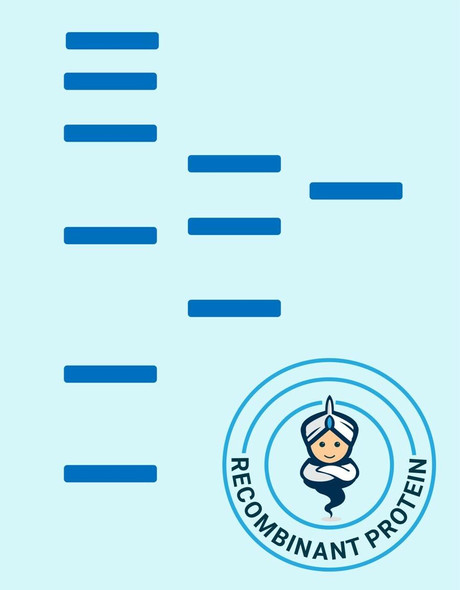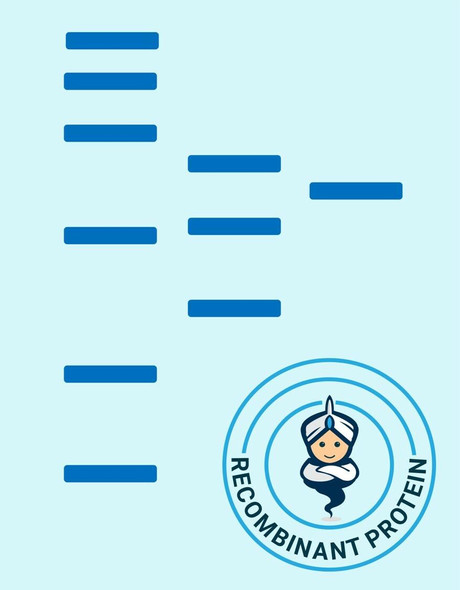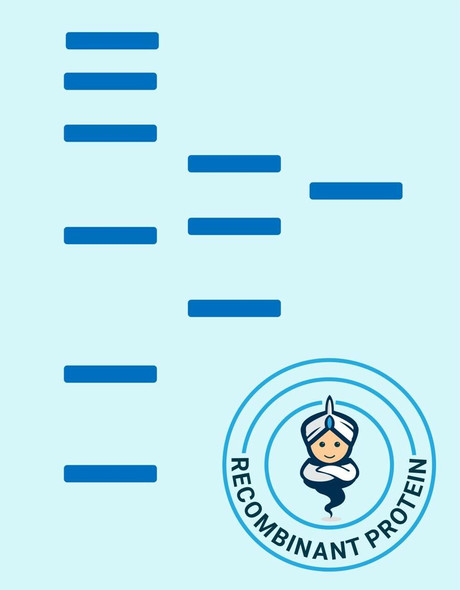Description
| Product Name: | Human CST6 Recombinant Protein |
| Product Code: | RPPB3292 |
| Size: | 10µg |
| Species: | Human |
| Target: | CST6 |
| Synonyms: | Cystatin E/M, cystatin 6, Cystatin M, Cystatin-E, Cysteine proteinase inhibitor. |
| Source: | Escherichia Coli |
| Physical Appearance: | Sterile Filtered colorless solution. |
| Formulation: | The CST6 solution (0.5mg/ml) contains 20mM Tris-HCl buffer (pH 8.0), 1mM DTT, 0.1M NaCl and 10% glycerol. |
| Stability: | Store at 4°C if entire vial will be used within 2-4 weeks. Store, frozen at -20°C for longer periods of time. For long term storage it is recommended to add a carrier protein (0.1% HSA or BSA).Avoid multiple freeze-thaw cycles. |
| Purity: | Greater than 95% as determined by SDS-PAGE. |
| Amino Acid Sequence: | MGSSHHHHHH SSGLVPRGSH MRPQERMVGE LRDLSPDDPQ VQKAAQAAVA SYNMGSNSIY YFRDTHIIKA QSQLVAGIKY FLTMEMGSTD CRKTRVTGDH VDLTTCPLAA GAQQEKLRCD FEVLVVPWQN SSQLLKHNCV QM |
CST6 belongs to the type 2 cystatin family. Unlike other family members that act as active cysteine protease inhibitors, CST6 restrain the inhibition of cathepsin B but is not active against cathepsin C. CST6 are secretable proteins that influence osteogenesis and bone resorption, regulation of the hepatocyte growth factor receptors, and the response to systemic inflammation.
CST6 Human Recombinant produced in E.coli is a single, non-glycosylated polypeptide chain containing 142 amino acids (29-149) and having a molecular mass of 15.9 kDa.The CST6 is fused to a 21 amino acid His-Tag at N-terminus and purified by proprietary chromatographic techniques.
| UniProt Protein Function: | CST6: Shows moderate inhibition of cathepsin B but is not active against cathepsin C. Belongs to the cystatin family. |
| UniProt Protein Details: | Protein type:Secreted; Motility/polarity/chemotaxis; Secreted, signal peptide Chromosomal Location of Human Ortholog: 11q13 Cellular Component: cornified envelope Molecular Function:cysteine protease inhibitor activity Biological Process: epidermis development; anatomical structure morphogenesis |
| NCBI Summary: | The cystatin superfamily encompasses proteins that contain multiple cystatin-like sequences. Some of the members are active cysteine protease inhibitors, while others have lost or perhaps never acquired this inhibitory activity. There are three inhibitory families in the superfamily, including the type 1 cystatins (stefins), type 2 cystatins and the kininogens. The type 2 cystatin proteins are a class of cysteine proteinase inhibitors found in a variety of human fluids and secretions, where they appear to provide protective functions. This gene encodes a cystatin from the type 2 family, which is down-regulated in metastatic breast tumor cells as compared to primary tumor cells. Loss of expression is likely associated with the progression of a primary tumor to a metastatic phenotype. [provided by RefSeq, Jul 2008] |
| UniProt Code: | Q15828 |
| NCBI GenInfo Identifier: | 4503113 |
| NCBI Gene ID: | 1474 |
| NCBI Accession: | NP_001314.1 |
| UniProt Secondary Accession: | Q15828,Q540N7, |
| UniProt Related Accession: | Q15828 |
| Molecular Weight: | 16,511 Da |
| NCBI Full Name: | cystatin-M |
| NCBI Synonym Full Names: | cystatin E/M |
| NCBI Official Symbol: | CST6�� |
| NCBI Protein Information: | cystatin-M; cystatin 6; cystatin M; cystatin-6; cystatin-E; cystatin M/E; cysteine proteinase inhibitor |
| UniProt Protein Name: | Cystatin-M |
| UniProt Synonym Protein Names: | Cystatin-6; Cystatin-E |
| Protein Family: | Cystatin |
| UniProt Gene Name: | CST6�� |
| UniProt Entry Name: | CYTM_HUMAN |









